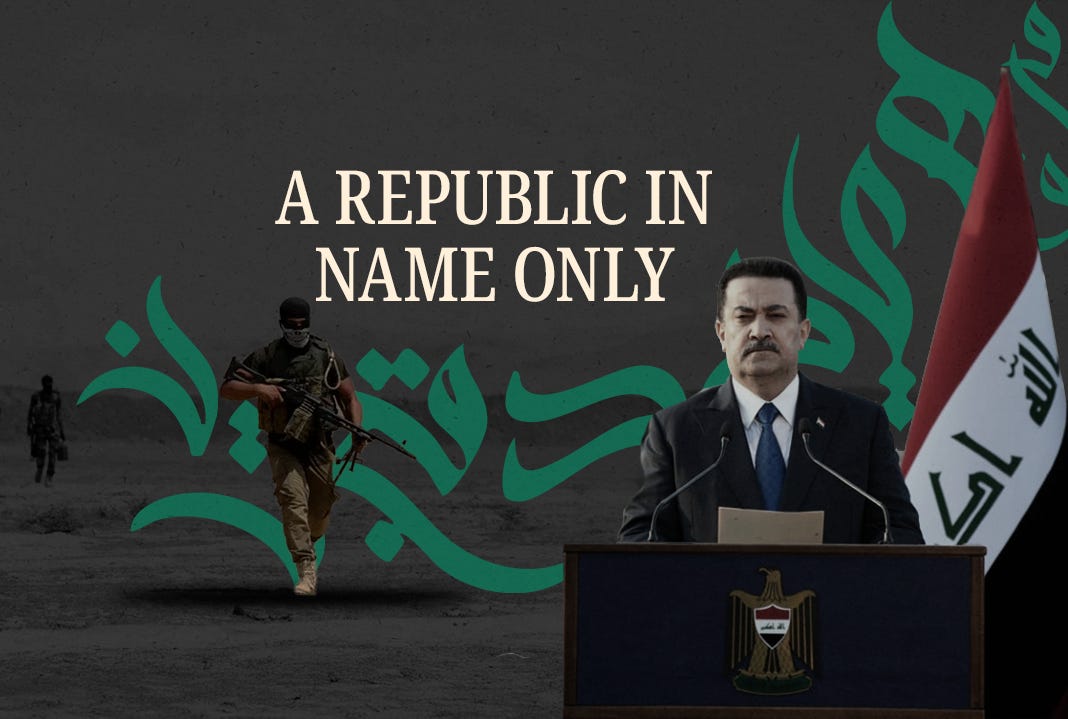A Republic in Name Only
Two rival systems now govern Iraq: one constitutional, the other built on militias, corrupt finance, and Tehran’s reach
BAGHDAD, Iraq — Iraq today is less a republic than a contested terrain—split between a constitutional state struggling to survive and a parallel order of militias, illicit finance, and external patrons. The power struggle between the two sides plays out daily in Baghdad’s ministries, in Sulaymaniyah’s streets, and at our country’s borders. The question is no longer whether Iraq can balance the two systems, but how long it can endure the strain.
On July 27, Iran-aligned Kataib Hezbollah fighters stormed the Ministry of Agriculture in Baghdad to protect a corrupt director facing dismissal. The raid left at least two dead and laid bare how militias operate under the assumption that laws don’t apply to them. Prime Minister Mohammed Shia al-Sudani responded forcefully: “No entity is above the law.” He ordered dismissals, judicial referrals, and a leadership probe into the Popular Mobilization Forces (PMF). Yet such measures reveal weakness as much as resolve. Each confrontation forces the state to prove its existence against groups that operate outside it.
Legislative battles are no less fraught. Parliament’s consideration of a PMF law collapsed this week after the government withdrew the bill amid fierce internal divisions and mounting U.S. pressure. Washington had warned that the measure risked enshrining militia power rather than curtailing it, and Iraqi officials admitted that the threat of crippling sanctions forced Baghdad’s hand. The law would have formally integrated the PMF as a permanent, state-controlled armed force, elevating its status to that of a ministry-like institution under the Prime Minister's command. Even without a vote, Kataib Hezbollah’s secretary-general Ahmed al-Hamidawi demanded that ruling coalition leaders “take decisions that would safeguard Iraq and its sanctities until Sudani’s term ends on November 11,” claiming al-Sudani had “lost his balance.” This was governance by intimidation—a structural veto exercised by armed actors beholden not to Baghdad, but to Tehran.
The Kurdistan Region offers a sobering illustration of how fragile Iraq’s federal equilibrium has become. On August 22, security forces raided a Sulaymaniyah hotel to arrest opposition figure Lahur Sheikh Jangi Talabani. The ensuing firefight left five dead, more than a dozen wounded, and neighborhoods terrorized overnight. The Patriotic Union of Kurdistan defended the raid as necessary to stop a coup plot. Critics called it a political purge carried out with tanks and drones in a major city.
And Baghdad looked on, largely powerless. What should have been an internal matter of federal authority became another episode in Iraq’s fragmented sovereignty, with each faction policing its rivals with impunity.
Even as Iraq’s leaders wrestle with militias and regional divides, the U.S.-led coalition is drawing down. By September, missions at Baghdad International and Ain al-Asad air base will end, shifting security cooperation to a bilateral framework. Iraqi officials present this as a planned transition, but the withdrawal strips away a buffer that often deterred militia overreach. Washington insists its role will continue in an advisory capacity. Yet with American deterrence receding, Tehran and its proxies may soon test the boundaries of Iraq’s sovereignty more aggressively.
Notably, Iraqi militias have exercised restraint even after U.S. strikes against Iranian nuclear sites this summer. Analysts suggest the “Axis of Resistance” is recalibrating—choosing to preserve influence rather than provoke escalation. But restraint should not be mistaken for retreat. The parallel state thrives in moments like these, embedding itself deeper into Iraq’s political economy through oil smuggling, border racketeering, and currency manipulation.
Meanwhile, the Islamic State lingers. Sleeper cells are reactivating, recruitment networks remain alive, and recent arrests prevented a suicide bombing. The official Iraqi state, already overstretched, cannot afford a security relapse. Every militia raid and financial scandal diverts energy away from counterterrorism efforts to internal survival.
Despite the entrenched power of militias, Baghdad has not surrendered its sovereignty. Prime Minister al-Sudani has pursued a careful policy of diversification by deepening energy and investment ties with the Gulf states, advancing talks with Turkey over water and trade corridors, and seeking new defense cooperation frameworks with Europe. Most notably, Iraq has begun enforcing stricter controls over its currency markets and border crossings, a move meant to curb money laundering schemes long exploited by Iran-backed networks. Senior officials frame these steps as a strategy of gradual disentanglement, signaling that Baghdad is making incremental moves to loosen Tehran’s grip on its politics and economy.
For too long, Western policy has operated under a fiction that Iraq is a unified state partner. But the reality is two Iraqs—one constitutional yet besieged, the other empowered by arms and external allegiance. Treating them as one only strengthens the latter.
A credible policy would entail attaching conditions to aid, including dismantling rogue militias, insulating the judiciary from coercion, and curbing illicit finance. Without such leverage, Iraq will continue as a republic in name only—an arena where sovereignty becomes an empty slogan while militias dictate reality.
A fragmented Iraq undermines global energy stability, regional security, and counterterrorism efforts. Unless Baghdad is enabled—and frankly pressured—to boldly reassert state authority, the future is not a republic at all, but a battlefield of competing patrons and perpetual disorder.
Middle East Uncovered is powered by Ideas Beyond Borders. The views expressed in Middle East Uncovered are those of the authors and do not necessarily reflect the views of Ideas Beyond Borders.




Thanks for this informative article. We get so little background info on the Middle East. So it’s hard to interpret news in context. This article also gives some policy suggestions which is useful. Westerners have a hard time understanding the many forces at play -it’s mindboggling - in Arab societies and each country is different. But understand them we must if we are to support helpful U.S. policy.
Another very informative article, thanks.